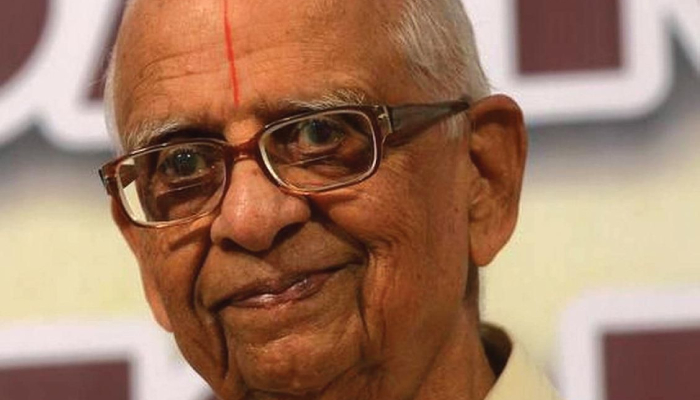
or

An erudite Hindu scholar and a quintessential government lawyer, K. Parasaran has enjoyed the trust of every administration since the 1970s. His courtroom orations are often lectures in Hindu scriptures. So much so, that Supreme Court judge and former chief justice of Madras High Court Sanjay Kishan Kaul referred to Parasaran as the “Pitamaha of the India Bar for his contribution to the law without compromising with his dharma”.
Born 1927 in Srirangam district of Tamil Nadu, Parasaran is the son of Kesava Iyengar and Shrimati Ranganayaki. His father was a lawyer and Vedic scholar who practised at the Madras High Court and the Supreme Court. In 1949, he married Saroja, and has three sons and two daughters. Parasaran’s three sons, Mohan Parasaran, Satish Parasaran and Balaji Parasaran are also lawyers. Mohan Parasaran briefly served as Solicitor General in the UPA-2 regime. The family’s fourth generation has also joined the Bar.
While pursuing his BL (now, BA. LLB), Parasaran was awarded the Shri Justice C.V. Kumaraswami Sastri Sanskrit Medal and Justice Shri V. Bhashyam Iyengar Gold Medal in Hindu Law. During the Bar Council examination, he received the Justice Shri K.S. Krishnaswamy Iyengar Medal. Parasaran began his legal practice before the Supreme Court in 1958.
K Parasaran is a senior Supreme Court advocate who in a legal career spanning over six decades, served as the Attorney General of India under Indira Gandhi and Rajiv Gandhi between from 1983 to 1989. He had earlier served as the Advocate- General of Tamil Nadu during President’s rule in 1976.
Later, he was appointed as a member of the drafting and editorial committee tasked with reviewing the working of the Constitution and was awarded with the Padma Bhushan in the year 2003. He was also awarded with Padma Vibhushan in the year 2011. In June 2012, he received a presidential nomination to the Rajya Sabha, the upper house of India’s parliament, for a period of six years.
As member of Rajya Sabha in 2014, he defended the National Judicial Appointments Commission. “Independence of the judiciary means institutional independence and is not related to each individual judge at the time of appointment. There is a great error in the thinking of the judges that if the executive appoints a judge he can never be independent,” he said.
Despite defending the government for decades, Parasaran did not shy away from disagreeing with the political leadership. In 1985, as Solicitor General of India, he advised the government to not act on the show-cause notice issued to demolish the Indian Express building as it was legally untenable. However, when the Indira Gandhi government ignored his opinion, he refused to defend the government in court and offered to resign if he was forced to appear. The government, despite his public statement, not only kept him in office but promoted him as Attorney General of India in two months.
Since 2016, Parasaran’s appearances in court have been rare. But then, two big cases have brought the veteran senior lawyer and former two-time Attorney General of India back from Chennai to Delhi — the Sabarimala case and the Ayodhya dispute.
His knowledge of the Indian Constitution and ancient dharma has been praised by various senior lawyers. This was on display during the Sabarimala trial in the Supreme Court, wherein Parasaran had argued in favour of upholding the traditions of the temple. During the trial Parasaran while appearing for the Nair Service Society had argued that the celibate nature of the deity and not misogyny was the basis for the practice barring entry of women. He had added that Lord Ayyappa’s Naishtika Brahmachari avatar is protected by the constitution. However, the five-judge bench of the Supreme Court decided against the arguments and allowed entry of women.
His most important engagement in recent days has been to serve as the lead counsel for the Hindu side in the Ram Mandir-Babri Masjid case where he successfully argued for possession of the entire disputed land in the Supreme Court in favour of the deity “Ram Lalla Virajman”.
One of the most fiercely fought battles in the country’s judicial history witnessed the veteran lawyer holding the fort from the front for the Hindu parties. As reported, his dedication to the case can be inferred by the fact that every day he worked on every aspect of the case before the hearing began and well into the evening after it concluded. During the hearing, the 92-year-old senior lawyer had told the apex court that it must do “full and complete justice” in all matters before it and that his last wish before he dies was to finish the case.
The LW Bureau is a seasoned mix of legal correspondents, authors and analysts who bring together a very well researched set of articles for your mighty readership. These articles are not necessarily the views of the Bureau itself but prove to be thought provoking and lead to discussions amongst all of us. Have an interesting read through.

Lex Witness Bureau

Lex Witness Bureau

For over 10 years, since its inception in 2009 as a monthly, Lex Witness has become India’s most credible platform for the legal luminaries to opine, comment and share their views. more...
Connect Us:


The Grand Masters - A Corporate Counsel Legal Best Practices Summit Series
www.grandmasters.in | 8 Years & Counting
The Real Estate & Construction Legal Summit
www.rcls.in | 8 Years & Counting
The Information Technology Legal Summit
www.itlegalsummit.com | 8 Years & Counting
The Banking & Finance Legal Summit
www.bfls.in | 8 Years & Counting
The Media, Advertising and Entertainment Legal Summit
www.maels.in | 8 Years & Counting
The Pharma Legal & Compliance Summit
www.plcs.co.in | 8 Years & Counting
We at Lex Witness strategically assist firms in reaching out to the relevant audience sets through various knowledge sharing initiatives. Here are some more info decks for you to know us better.
Copyright © 2020 Lex Witness - India's 1st Magazine on Legal & Corporate Affairs Rights of Admission Reserved